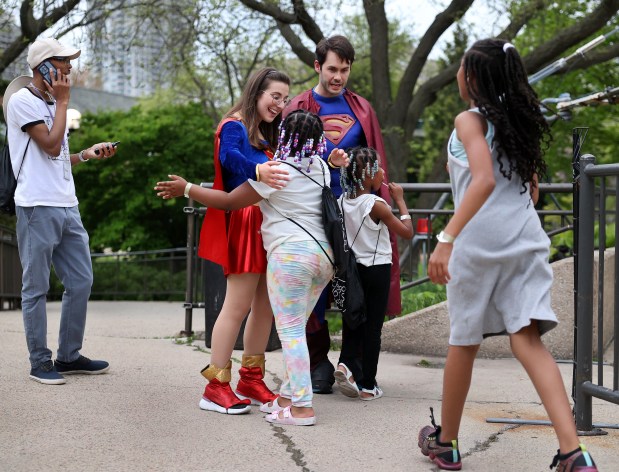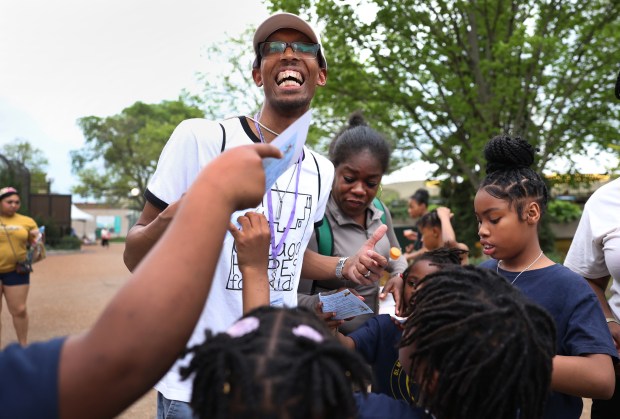In the shadow of the carousel at an otherwise empty Lincoln Park Zoo, a crowd of children rushing ahead of their families shrieked as they saw two grown-ups dressed as Superman and Supergirl.
The superheroes’ sighting checked off a scavenger hunt box on an evening when the zoo was closed to everyone except the hundreds of families served by Chicago HOPES for Kids, a nonprofit organization that provides academic support to children experiencing homelessness and housing insecurity.
Outings like the trip to the zoo are one of many opportunities that Chicago HOPES offers to the disadvantaged kids it serves. But those large field trips require dozens of chaperones and are one of the likely casualties this summer of federal budget cuts to AmeriCorps, whose members are a crucial part of the operation, HOPES Program Director Dajuan King said.
“No way around it — our program, at least half our staffing model is AmeriCorps,” King said during last week’s zoo visit, as a late spring thunderstorm approached overhead. “It’s really limiting how many families we can serve.”
AmeriCorps members are typically college students or recent graduates who are paired with service programs across the country and receive a stipend and an educational award for loans or tuition. It’s one of the many federal agencies to suffer massive funding cuts and program terminations as President Donald Trump’s administration seeks to reduce government spending.
The Trump administration in April eliminated state-administered grants for 28 AmeriCorps programs in Illinois, affecting more than 630 members statewide, according to a lawsuit filed by Illinois Attorney General Kwame Raoul, 23 other states and the District of Columbia.
The sprawling programming at AmeriCorps, an agency with an operating budget of $1 billion, has been a target of critics who cite it as an example of government bloat. In a response to a request for comment, the White House pointed to an AmeriCorps report showing the agency made about $45 million in improper payments last fiscal year.
Most of those payments were deemed improper as the result of “improper or insufficient or unavailable documentation,” the AmeriCorps report said.
In Illinois, the immediate cuts will leave some programs for the summer shuttered or scrambling for volunteers, program leaders said. About 20 AmeriCorps members working with Chicago HOPES had their stipends terminated last month, Executive Director Rita Kahn said.
The organization is planning for an expected reduction of nearly 40% in the number of children it’s able to serve this summer, King said.
Nationally, the Trump administration terminated nearly $400 million worth of programs last month, the lawsuit said.
Raoul, who has filed a series of lawsuits with other attorneys general against Trump administration actions in recent months, in a statement called the AmeriCorps cuts “illegal and meritless.”
After the suit was filed, White House deputy press secretary Anna Kelly told The Associated Press that Trump “has the legal right to restore accountability to the entire Executive Branch.”
Other programs affected by cuts to AmeriCorps funding include the Boys & Girls Clubs of Chicago, Sinai Health System and Greater Chicago Food Depository, the multistate lawsuit said.
In the Rockford area, the loss of AmeriCorps members will mean canceled summer field trips and pop-up programming like guided hikes to see wildflowers and birds, said Ann Wasser, executive director of the Severson Dells Nature Center. Community science programs to engage volunteers in monitoring local bees, bats, dragonflies and water quality likely also will not happen this summer due to the cuts, she said.
AmeriCorps members at Chicago HOPES supported the organization’s small group reading and tutoring. In the summer, programming shifts away from homework to general literacy help and activities outside of school.
Arlene Gunn, 44, has two children who participate in Chicago HOPES programs at A House in Austin, a nonprofit that provides family support, and credits Chicago HOPES for suggesting that her daughter may be eligible for an individualized education program at school — a change she said resulted in her daughter Samariel’s grades rising to A’s and B’s.
“I didn’t know until they started working with her, and they started telling me, this is her strength, this is what her weakness is,” Gunn said.
A House in Austin typically has three or four AmeriCorps members, and without them capacity will be limited, said King, the program director. Across Chicago HOPE’s dozen sites citywide, which include community centers like the Austin location as well as programs within homeless shelters, King is expecting to reduce service from about 130 to 80 children this summer.

Gunn is planning to try to sign her children up for the summer term.
“It’s always something they can learn from,” Gunn said of her children’s experience in the program. “They’re always learning.”
Samariel, 10, said she feels like she’s gotten to know her tutors.
“They understand what we’re going through,” she said. “When other kids are going through stuff, they help us calm down.”
That consistency will be lost with the AmeriCorps cuts, said Chicago HOPES founder Patricia Rivera. While AmeriCorps members worked multiple shifts a week — some close to full time — community volunteers are often there just once a week for a few hours, meaning many more are needed to cover the same amount of programming and kids don’t get to know those tutors as well.
“These kids have had a lot of trauma,” Rivera said of the group her organization serves. “And they’ve had situations with their families where they kind of wonder, who do you trust? What do you do? Who can you call on for help? And we do want to give them a message that we’re going to be there for you.”
“It makes it hard for us to follow through,” she said about the recent changes.
In April, AmeriCorps member Mia Hainer was among those who learned her term at Chicago HOPES was ending and her stipend of almost $900 every two weeks had been terminated. She was 129 hours away — out of a 1,200-hour term — from being eligible for an educational award of about $5,100.
“They kind of just left everyone stranded,” she said of the Trump administration and its cost-cutting arm, the Department of Government Efficiency.

The educational award is a major draw to AmeriCorps for many people, Hainer said at a roundtable discussion earlier this month with both U.S. senators from Illinois, Department of Human Services Secretary Dulce Quintero and others involved with AmeriCorps in Illinois.
Hainer, a 24-year-old graduate of Loyola University Chicago who led the zoo trip, had the means to stay on for the final weeks of her planned service at Chicago HOPES and decided to continue as an unpaid volunteer. Half of the approximately 20 AmeriCorps members at Chicago HOPES made the same decision, agreeing to serve unpaid for at least a few weeks.
While Chicago HOPES was able to keep spring programming with a combination of now-unpaid AmeriCorps members and community volunteers, summer programming will be tougher, leaders said. The organization needs volunteers during the day in summertime, and it’s difficult to pull those individuals from a community pool that has commitments for work or vacations, said Jenn Harden-Finn, who manages volunteers.
Hainer secured a paid summer position with Chicago HOPES, and then in the fall will be starting a master’s in social work program at the University of Chicago in September, a choice she attributes directly to the hands-on experience she had with the organization.
“If I hadn’t done AmeriCorps, I wouldn’t have wanted to pursue social work,” Hainer said.
AmeriCorps programs have previously received bipartisan support in Congress, but the cuts come as Republicans in Congress are looking to pass trillions of dollars in spending and tax cuts.
Funding was maintained for seven AmeriCorps programs administered by DHS in Illinois, including three in Chicago, the department said.

One organization expecting to continue receiving AmeriCorps funding is adult literacy organization Literacy Volunteers of Illinois, extending a program that’s lasted for nearly 30 years to become one of the longest-running AmeriCorps programs in the state, said Executive Director Chamala Jordan, who is an AmeriCorps alum.
Illinois’ Democratic U.S. senators, Tammy Duckworth and Dick Durbin, have both drawn attention to the cuts at AmeriCorps, describing the program as an investment both in communities receiving services and in people who want to work on those services while receiving some compensation.
“Dollar for dollar,” Duckworth said at a discussion with AmeriCorps leaders earlier this month, “AmeriCorps punches above its weight.”
The Associated Press contributed.




